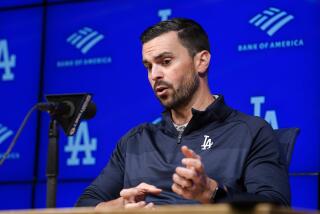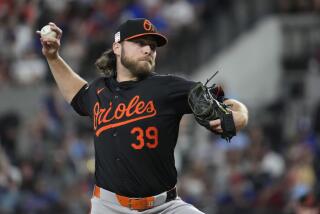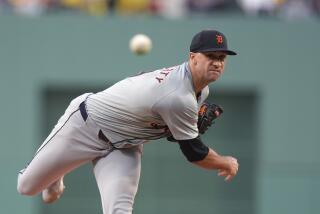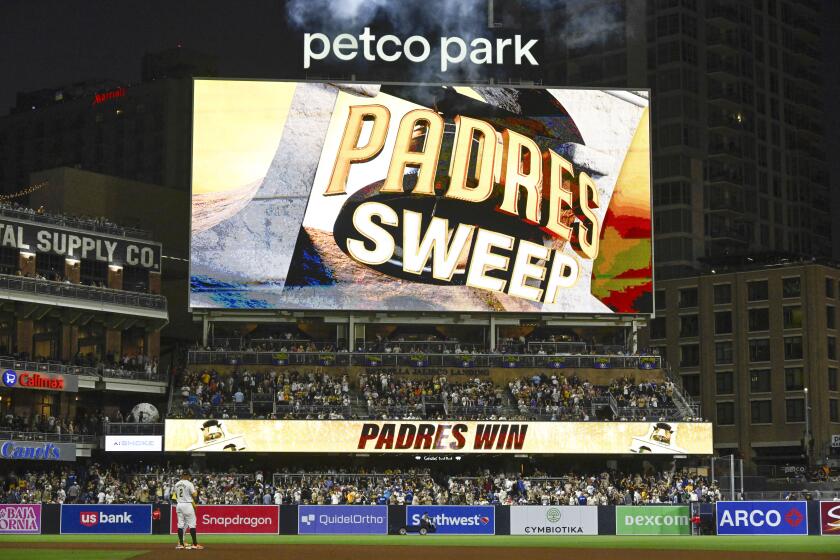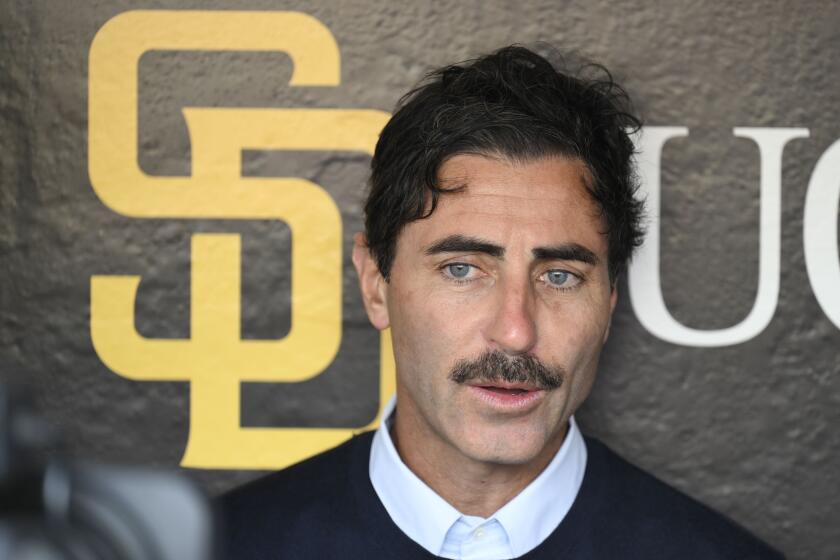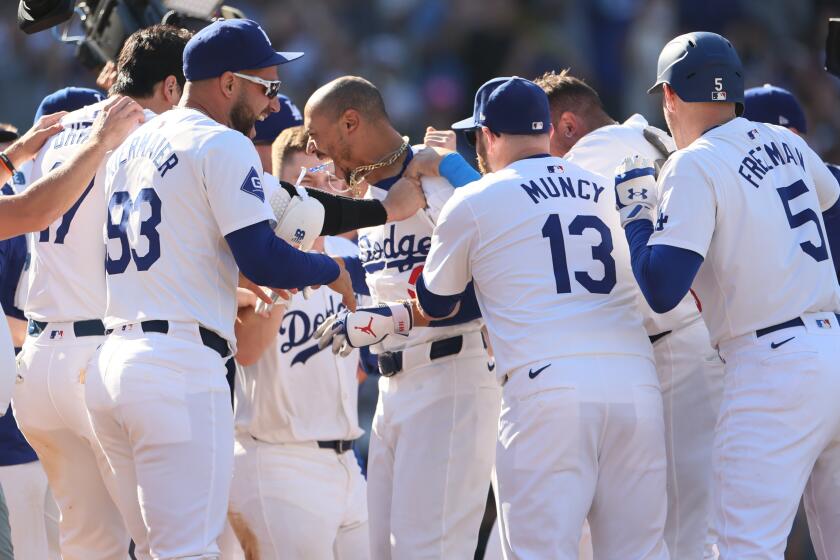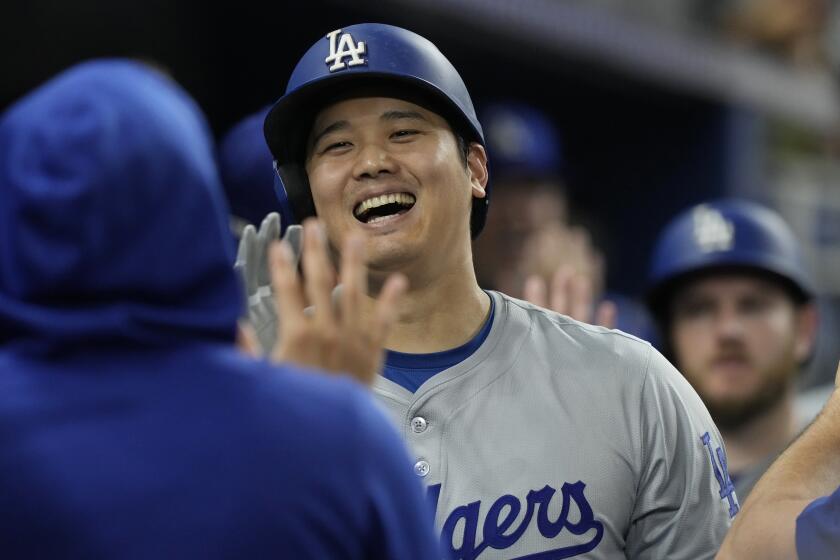Analysis: Dodgers’ Andrew Friedman needs to adjust to big-market demands
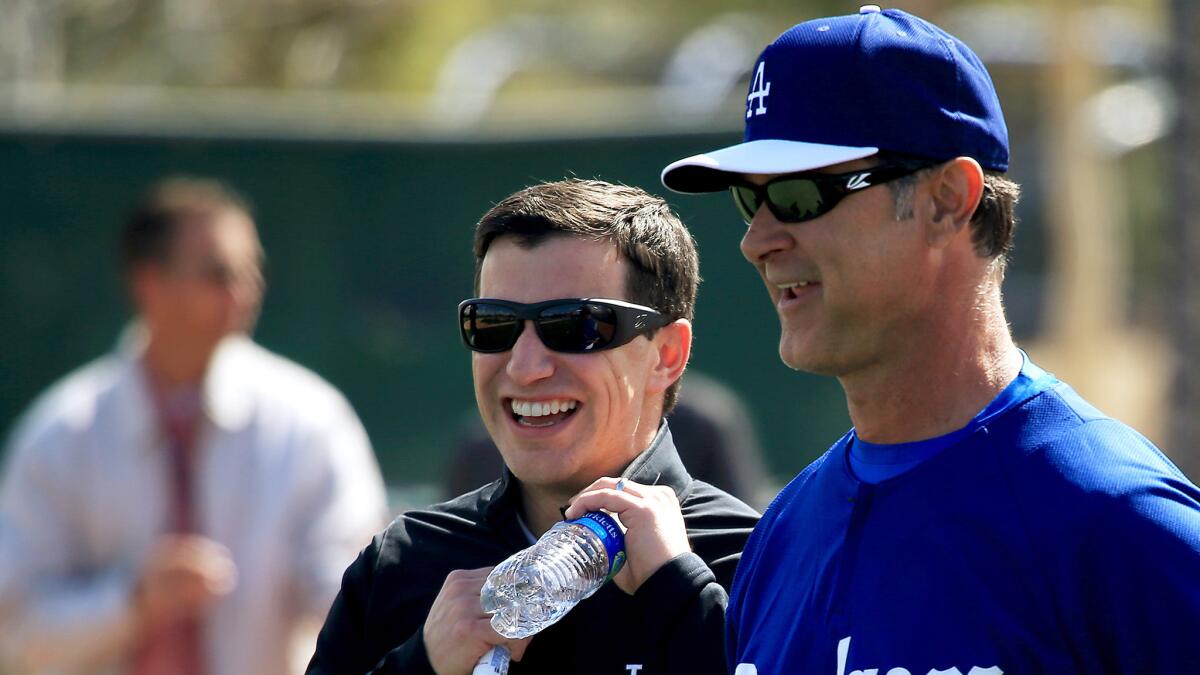
Andrew Friedman, Dodgers president of baseball operations, will soon help decide the fate of Manager Don Mattingly as well as reshape a roster that has plenty of holes.
The new kids get some leeway, right? Time to settle in, get the lay of things, figure out exactly where to make an impact.
Andrew Friedman arrived as the Dodgers’ head of baseball operations a year ago. He was not shy about implementing change. The front office underwent a dramatic transformation, and soon, the roster did too.
And on it went, the former Tampa Bay Rays wunderkind shuffling players on and off the roster nonstop all season. Here today, gone the next hour. When the dust settled, the Dodgers had been knocked out of the playoffs exactly as they had the year before.
SIGN UP for the free Dodgers Dugout newsletter >>
That was all interesting, but may serve as mere prelude to this off-season. Now with a year behind him, his metric-happy people all in place and no longer feeling as if he’s starting behind other clubs, Friedman will show whether he’s evolving or rigid in approach.
Is Friedman truly a big-market president of baseball operations?
He was revered throughout baseball for the way he was inventively able to make the small-budget Rays competitive. Pundits all but threw roses at his feet. He was smart and cutting-edge and resourceful.
But what works in small-market Tampa Bay doesn’t necessarily translate to Los Angeles. Coming close is not enough. Expectations here are for championships. Particularly for a team that hasn’t won a World Series in 27 painfully long years.
So even with the Dodgers advancing to the playoffs this fall for a record third consecutive year, the season was viewed as a disappointment — in and outside the clubhouse — when the Dodgers fell in the first round.
“Making the playoffs is good,” reliever Chris Hatcher said. “It’s not good enough.”
When it was over, winning 92 games and a third consecutive division title still felt like underachievement.
“Everyone here wants to win the World Series. We had the team to do it,” Enrique Hernandez said. “Everybody here thinks if there’s not a championship, it’s a failure.”
Those are some lofty standards, but they’re also reality. Expectations are huge here to win now. And when Friedman and General Manager Farhan Zaidi made modest moves at the trading deadline, they weren’t convincing anyone they truly understood the urgency.
Now Friedman will be served a new test. And the results should indicate whether he’s flexible and adapting his skills to his new team.
Friedman has never signed a free agent to a $100-million contract. He is, understandably, not fond of signing 30-year-old starting pitchers to expensive, multiple-year deals. As Dodgers Chairman Mark Walter once famously said, “pitchers break.”
But the time to be flexible is at hand. One way or another, if Friedman is going to advance this team, he’ll have to sign a pitcher on the wrong side of 30 to a long-term deal well in excess of $100 million.
Zack Greinke can opt out of the last three years and $71 million on his contract, and is expected to do exactly that. He has made it clear he would like to remain with the Dodgers, but he’s a highly practical man who has a keen appreciation for baseball economics.
He’ll also be 32 next week, and there has been some history of minor elbow soreness. Last off-season, Jon Lester, a few weeks shy of turning 31, signed for seven years and $155 million with the Chicago Cubs. Max Scherzer, 30 last off-season, received seven years and $201 million from the Washington Nationals.
Greinke may love L.A., but that doesn’t figure to translate into a $75-million hometown discount.
If Friedman doesn’t re-sign Greinke or go after a David Price, he’s looking at a rotation of Clayton Kershaw and four guys. He can’t keep going to second-tier starting pitchers.
Last off-season, Friedman gave Brandon McCarthy $48 million over four years — the biggest free-agent contract of his career — so you can understand his reluctance to go some three times that on a starter. McCarthy made four starts and had Tommy John surgery.
Hyun-Jin Ryu never did make a start and underwent shoulder surgery. Brett Anderson, signed to be the fifth starter, probably will become a free agent. The only other starter the Dodgers know they have returning besides Kershaw is Alex Wood.
This is going to require the kind of bold, expensive addition that Friedman is loath to make. That he never had to make in Tampa. Only this isn’t Tampa, and here you are expected to do everything to win now.
Leeway doesn’t last long. This is his team and organization, and we’ll see whether they’re open to change, to overcoming instincts.
A big market is watching.
Dilbeck is the main contributor to the Dodgers Now blog at latimes.com/dodgers. Follow him during the off-season for news and more analysis.
MORE DODGERS NEWS:
With Don Mattingly’s fate uncertain, Dodgers players offer support
Don Mattingly says Andre Ethier was yelling about umpire’s call, not at him
Dodgers can’t find their way, fall in elimination game to Mets, 3-2
More to Read
Are you a true-blue fan?
Get our Dodgers Dugout newsletter for insights, news and much more.
You may occasionally receive promotional content from the Los Angeles Times.
